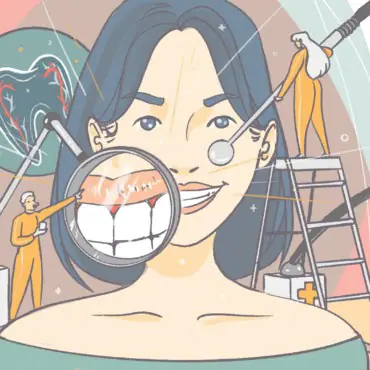Ever wonder whether the role of a dental assistant might be the right career option for you? Learning more about this position’s typical responsibilities, the required training, and career opportunities can help determine if you should start taking steps to obtain your degree and which route would work best for you. Let’s break it down, starting with what is a dental assistant?
Dental Assistants 101
You’ve likely seen a dental assistant performing a wide variety of tasks around an office. A sort of employee of all trades, a dental assisting career, requires you to interact with patients and handle dental technology that ensures the best service level. The role requires assisting dentists (bet you guessed that one) with everything to ensure the patient’s visit runs smoothly, from preparing the dental operatory, assisting with the procedure, explaining and engaging with patients and maintaining sterilization protocol. With a mix of technical skills and interacting with patients, a dental assisting career offers variety and challenge. It is ideally suited to those who enjoy following a process and giving compassionate care.
What would I do as a dental assistant?
The technical side
Depending on the office, your day as a dental assistant will likely vary. But everyday responsibilities include: working with x-rays, interacting with patients, assisting with procedures, and overseeing sterilization efforts and protocols. This role allows you to flex your technical abilities and be responsible for ensuring all tools are cleaned and cared for. Having organizational skills will be vital, especially when billing and ordering supplies to keep the practice stocked and running efficiently.
The people-person side
If you love helping others, this role requires plenty of face-to-face time with patients. Dental assistants are the ones who settle patients into the exam rooms and ensure they’re comfortable. Patients often look to you for guidance and assurance, especially when they are nervous about the procedure. This role gives you the chance to help patients take the right steps in the upkeep of their oral health. Teaching aftercare techniques and explaining dental procedures to patients of all ages lets you act as a patients’ coach and cheerleader.
As a dental assistant, you get to help with many interesting dental operations and every day is a different challenge. Suppose you’re the type of person that loves to switch up your daily routine and use your skills in many areas, both clinical and office management . In that case, a dental assisting career might be the ‘perfect fit.’
Find a top rated dentist near you that takes your insurance.Due for a checkup?
What will I need for a dental assistant career?
Should you decide to follow this career path, there are multiple education and training options available. College-level education will give you the training required for this position’s technical and oral health knowledge requirements. The one year program needed to get your dental assistant degree is available at public and private colleges across the country. Depending on the program, you may get to experience hands-on assisting placements at private clinics, public health clinics and at the local dental university clinics. During your program, you will gain in-depth skills related to taking x-rays, taking impressions, assisting techniques, dental instruments and dental procedures.
Education requirements can vary by province, so be sure to check for dental assisting information for your specific area.
Where are the job opportunities for a dental assistant?
According to the ADA and CDA, the current demand for dental assistants is high. As dental offices grow, the benefits of having a skilled dentist assistant as an employee that can help with patients, supplies, and office management are incredibly beneficial. A great dental assistant is a valued and respected team member. Because of this demand, there are often multiple full-time and part-time positions available. The U.S. Bureau of Labor Statistics reports a promising dental assistant job outlook, with an above-average growth rate of approximately 11% by 2028.
All types of practices, including solo, group, and specialty practices, require dental assistants on their teams with varying levels of responsibility and skills. But don’t forget to look at public health clinics, hospital dental clinics, or school clinics.
With additional schooling, dental assistants can find employment at community college dental schools, universities, technical institutes, or vocational schools.
How do I know if dental assisting is right for me?
Consider your goals first. Do you enjoy working with people and find providing excellent care and service rewarding? Do you want responsibility in your position for important tasks? Are you willing to jump in to help others wherever you’re needed? You will need in-person and on the phone communication skills. Updating patient records, emailing suppliers, and using booking systems will mean you need to be comfortable and competent on a computer.
If the questions above got you excited about what a day on the job could look like, start looking into dental assisting career requirements in your area. You got this.
Opencare takes the guesswork and effort out of insurance verification.Worry-free insurance verification









